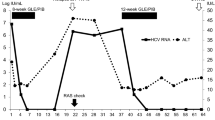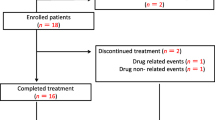Abstract
Although NS3/4 protease inhibitor glecaprevir (GLE) plus NS5A inhibitor pibrentasvir (PIB) therapy has a high efficacy for chronic hepatitis C virus (HCV)-infected patients with hemodialysis, some patients fail to respond to the therapy. Here, we report a hemodialysis genotype 2 HCV-infected patient who achieved sustained virological response (SVR) by 12 weeks of GLE/PIB therapy after failing to respond to 8 weeks of GLE/PIB therapy. A 44-year-old man with chronic genotype 2a HCV-infection without any evidence of cirrhosis and who was undergoing hemodialysis received GLE/PIB therapy. He completed 8 weeks of therapy, but his serum HCV relapsed after the end of therapy. No resistance-associated substitutions were detected in the NS3 region, but NS5A-C92C/S was detected by direct sequence analysis prior to the start of therapy and subsequently shifted to NS5A-C92S at the time of HCV relapse. Four months after initial GLE/PIB therapy, he started a 12-week course of GLE/PIB retreatment. Serum HCV RNA level became and remained undetectable during the therapy and never relapsed after the end of the treatment. Finally, he succeeded in achieving sustained virological response following 12 weeks of GLE/PIB retreatment.

Similar content being viewed by others
References
Lauer GM, Walker BD. Hepatitis C virus infection. N Engl J Med. 2001;345:41–52.
Tsui JI, Vittinghoff E, Shlipak MG, et al. Association of hepatitis C seropositivity with increased risk for developing end-stage renal disease. Arch Intern Med. 2007;167:1271–6.
Okubo T, Atsukawa M, Tsubota A, et al. Epidemiological survey of patients with hemodialysis complicated by hepatitis C in Japan. Ther Apher Dial. 2019;23:44–8.
Kalantar-Zadeh K, Kilpatrick RD, McAllister CJ, et al. Hepatitis C virus and death risk in hemodialysis patients. J Am Soc Nephrol. 2007;18:1584–93.
Toyoda H, Kumada T, Tada T, et al. Safety and efficacy of dual direct-acting antiviral therapy (daclatasvir and asunaprevir) for chronic hepatitis C virus genotype 1 infection in patients on hemodialysis. J Gastroenterol. 2016;51:741–7.
Kirby BJ, Symonds WT, Kearney BP, et al. Pharmacokinetic, pharmacodynamic, and drug-interaction profile of the hepatitis C virus NS5B polymerase inhibitor sofosbuvir. Clin Pharmacokinet. 2015;54:677–90.
Toyoda H, Chayama K, Suzuki F, et al. Efficacy and safety of glecaprevir/pibrentasvir in Japanese patients with chronic genotype 2 hepatitis C virus infection. Hepatology. 2018;67:505–13.
Kumada H, Watanabe T, Suzuki F, et al. Efficacy and safety of glecaprevir/pibrentasvir in HCV-infected Japanese patients with prior DAA experience, severe renal impairment, or genotype 3 infection. J Gastroenterol. 2018;53:566–75.
Atsukawa M, Tsubota A, Toyoda H, et al. The efficacy and safety of glecaprevir plus pibrentasvir in 141 patients with severe renal impairment: a prospective, multicenter study. Aliment Pharmacol Ther. 2019;49:1230–41.
Suda G, Hasebe C, Abe M, et al. Safety and efficacy of glecaprevir and pibrentasvir in Japanese hemodialysis patients with genotype 2 hepatitis C virus infection. J Gastroenterol. 2019;54:641–9.
Ogawa E, Furusyo N, Nakamuta M, et al. Glecaprevir and pibrentasvir for Japanese patients with chronic hepatitis C genotype 1 or 2 infection: results from a multicenter, real-world cohort study. Hepatol Res. 2019;49:617–26.
Kanda T, Lau GKK, Wei L, et al. APASL clinical practice recommendation: how to treat HCV-infected patients with renal impairment? Hepatol Int. 2019;13:103–9.
European Association for the Study of the Liver. EASL recommendations on treatment of hepatitis C 2018. J Hepatol. 2018;69:461–511.
Sezaki H, Suzuki F, Hosaka T, et al. Initial- and re-treatment effectiveness of glecaprevir and pibrentasvir for Japanese patients with chronic hepatitis C virus-genotype 1/2/3 infections. J Gastroenterol. 2019. https://doi.org/10.1007/s00535-019-01575-9.
Kosloski MP, Zhao W, Marbury TC, et al. Effects of renal impairment and hemodialysis on the pharmacokinetics and safety of the glecaprevir and pibrentasvir combination in hepatitis C virus-negative subjects. Antimicrob Agents Chemother. 2018;62:pii: e01990–17.
Ikeda H, Watanabe T, Atsukawa M, et al. Evaluation of 8-week glecaprevir/pibrentasvir treatment in direct-acting antiviral-naïve non-cirrhotic genotype 1 and 2 HCV patients in a real-world setting in Japan. J Viral Hepat. 2019. https://doi.org/10.1111/jvh.13170.
MAVIRET® [interview form]. Ver. 5. AbbVie. Tokyo; 2019.
Izumi N, Takehara T, Chayama K, et al. Sofosbuvir-velpatasvir plus ribavirin in Japanese patients with genotype 1 or 2 hepatitis C who failed direct-acting antivirals. Hepatol Int. 2018;12:356–67.
Acknowledgements
We thank Emi Nishio and Akemi Sata for technical assistance. This research is partially supported by research funding from the Research Program on Hepatitis from the Japan Agency for Medical Research and Development, AMED (Grant number: 18fk0210020h0002).
Author information
Authors and Affiliations
Corresponding author
Ethics declarations
Conflict of interest
Michio Imamura has received research funding from Bristol-Myers Squibb. Kazuaki Chayama has received honoraria from Bristol-Myers Squibb and MSD K.K. and research funding from Dainippon Sumitomo Pharma and AbbVie.
Human rights
All procedures followed have been performed in accordance with the ethical standards laid down in the 1964 Declaration of Helsinki and its later amendments.
Informed consent
Informed consent was obtained from all patients for being included in the study.
Additional information
Publisher's Note
Springer Nature remains neutral with regard to jurisdictional claims in published maps and institutional affiliations.
Rights and permissions
About this article
Cite this article
Ohya, K., Imamura, M., Osawa, M. et al. Successful retreatment with 12 weeks of glecaprevir and pibrentasvir for a genotype 2a HCV-infected hemodialysis patient who failed to respond to 8 weeks of prior glecaprevir and pibrentasvir therapy. Clin J Gastroenterol 13, 267–270 (2020). https://doi.org/10.1007/s12328-019-01039-w
Received:
Accepted:
Published:
Issue Date:
DOI: https://doi.org/10.1007/s12328-019-01039-w




